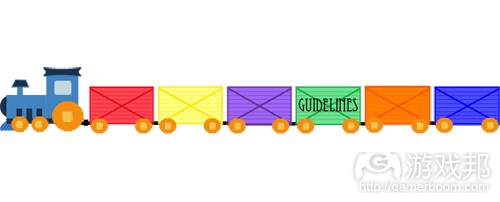关于游戏开发的51个指导性意见
作者:Struan Robertson
Struan Robertson列举了51个游戏开发指导意见,以下是游戏邦编译的相关内容:
1、重视游戏开发
2、我没有开玩笑,你必须重视游戏开发。最好留下20%的时间来修复漏洞。时刻记住游戏发布的时间和期限。
3、在项目开始时,深信自己能够制造出优秀的游戏。
4、在项目开始时,树立准时发布游戏并将成本控制在预算内的目标。
5、如果你能够细致做出决定并采用适当的开发方法,优秀的游戏和准时发布游戏两者间并没有冲突。
6、考虑你的设计团队和投资者的意见,他们的想法都需要考量,你需要找到两者间的平衡点。
7、调解。你最重要的工作是要防止富有天赋的团队分裂。
8、不可忽略音频制作。
9、为开发过程设定时间和预算。
10、理解游戏的愿景,并将其告知团队其他成员。
11、理解游戏的愿景,并将其告知投资者。
12、妥善处理与他人的关系。对所有合作者或上司都彬彬有礼。
13、如果你与游戏发行商合作,就要与游戏的品牌管理者联系。否则,他们有可能在开发的最终阶段对你造成伤害。
14、树立让所开发项目有合理盈利的目标,但是也不可目光短浅。设计精良但盈利较差的游戏能够增加公司的知名度,这与能够获得盈利的游戏同样有价值。
15、记住,如果投资者希望在游戏中含有更多的内容,那么你也可以要求他们投入更多的资金。
16、确保团队的活跃,团队中的双向对话很重要。
17、人们喜欢看到因他们自己的努力而获得奖赏。给人们提供目标但是让他们自行寻找解决方案。
18、利用前期加工来构建游戏,但是如果你在完成前期加工之后只得到了一些漂亮的文件,那么这还有待改善。
19、如果你没有更新,文件并不是很有用。
20、文件的更新是个非常繁琐的工作,所以不要编撰过多的文件。
21、为会议、对话或每天的工作做好准备。
22、有时候你需要微观管理内容。尽量在这方面花较少的时间,否则你会伤害到自己和你的项目。
23、当游戏要往新的方向发展时,要先做好准备。
24、如果你做出重大的改变,要有花大量时间来说服团队这是正确的做法的思想准备。关键在于,你要让整个团队跟上你的节奏。一对一跟他们交谈,或者使用邮件。
25、关注更广阔的市场,不要只关注你当前做制作游戏以及你喜欢玩的游戏的市场。
26、留心团队的局限性,对项目做出相应调整。你应该推动整个团队前进,但是不要有某些不切实际的期望。
27、你主要扮演的是协调者的角色。
28、在新技术被证实有效之前,不要对其过分迷信。
29、与他人交流并且鼓励整个团队进行交流。
30、尽早让QA就位。
31、不要忽视漏洞列表。
32、理解游戏品牌。
33、你可以寻求他人的帮助。寻求帮助并不奇怪,只要当团队知道你根本不清楚自己在做什么事情时,你才会对团队显得无足轻重。
34、用心倾听。
35、忽视网络上仇视者的攻击(游戏邦注:除非他们的说法是正确的)。
36、成为绝佳的故事讲述者。
37、犯错误,而且尽量早地犯错误。如果不犯错误,根本不知道做法的对错。
38、从错误中吸取教训。
39、履行诺言。
40、记住,有时候投资者并不是想给你找麻烦。
41、成为销售员。
42、承认错误。
43、注意小事情和错误。
44、如果有人问你问题,而你不知道答案,你可以跟他们说以后再回答。但必须确保将来会给他们答复。
45、理解投资者的个人动机是很重要的。这可以让你明白他们决策的缘由,对你的工作很有帮助。
46、提高你的项目呈现技能。
47、定期向上司汇报项目进展。
48、如果你是为多个上司工作,确保将这些邮件对话保存下来。
49、有时,做出任何决定都比不做出决定要好。
50、相信第一感觉。
51、享受游戏开发的乐趣。(本文为游戏邦/gamerboom.com编译,如需转载请联系:游戏邦)
51 Random Guidelines for Making Games
Struan Robertson
Hit your milestones
I’m serious, hit your bloody milestones. Get the work done with a good 20% of the milestone left for bug fixing and ephemera. Plan with these deadlines in mind.
Start every project with the belief that you can make a great game.
Start every project with the goal of getting it out on time and under budget.
Great games and on-time delivery aren’t mutually exclusive if you make careful decisions and employ good production methods.
Prioritise your work. Take into account your design team and your stakeholders’ wishes here. They’re both right, they’re both wrong, you need to help them find accord.
Mediate. Your most important job is preventing talented teams from tearing each other apart.
Don’t forget about audio.
Budget and schedule for the pitch process
Understand your game’s vision and sell it to the rest of the team at all times.
Understand your game’s vision and sell it to your stakeholders at all times.
Manage your relationships. Be courteous to all the people you work with or work for.
If you’re working with a publisher, get in contact with the brand manager on your game and get them on your side. They have the capacity to torpedo you in the final stages of dev.
Aim for a healthy profit in everything you do but don’t be short sighted – a well-executed but barely profitable job can extend your company’s portfolio and be just as valuable as a result.
Remember that it’s okay to ask for more money when your stakeholders ask for more stuff.
Make sure you’re developing your team. Personal reviews are important two-way conversations between you and the folk who keep you in a job.
People like to be rewarded with control over their work. Give people goals but let them work out how to achieve them.
Use pre-production to build something, even if you throw it away – if you finish pre-pro with nothing but a bunch of beautiful documents you’ve done it wrong.
Documents are not very useful if you don’t keep them up to date.
Keeping documents up to date is an absolute bitch so make fewer documents.
Prepare. For meetings, for conversations, for the start of every day.
Sometimes you need to micromanage stuff. Do it for as short a time as possible or it will kill you and your project.
Be prepared to pivot when things need to move in a new direction.
If you’re making a big change be prepared to spend a vast amount of time convincing the team that it’s the right thing to do. It’s vital you bring them with you. Do this with one-to-one’s, email, IM – do this with your general presence on the team.
Be aware of the wider market – your job goes beyond the current game you’re making and the games you like to play.
Be aware of your team’s limitations and guide your project accordingly. Aim to push your team but don’t rely on unrealistic expectations.
You are primarily a facilitator.
Don’t rely on new tech until it’s proven out.
Talk, and encourage your team to talk. I’ve never seen a team that’s buzzing produce work that’s late or subpar, EVEN IF ALL THEY’RE BUZZING ABOUT IS A FUNNY CAT ON THE WEB.
Get QA on board as early as you can afford them.
Don’t ignore the bug list.
Understand your game’s brand.
Asking for help is okay. You are at your weakest to your team when it becomes clear you don’t know what you’re doing, NOT when you’re asking for help.
Get really good at listening.
Ignore the haters on the Internet (unless they’re right).
Become a great storyteller.
Make mistakes – and make them early. You’re not trying if you don’t fuck something up.
Learn from your mistakes.
Keep your word.
Remember that there are times when your stakeholders are NOT actually trying to screw you
Become a sales person.
Admit it when you’re wrong.
The little stuff matters.
If someone asks you a question and you don’t think you know the answer, remember that it’s okay to say that you’ll get back to them. Just make sure you do get back to them.
Understanding the personal motivations of your stakeholders is important. It helps you get to the bottom of the why, which is important for when you start to work on the how.
Work on your presentation skills
Tell the people above you what’s happening on a regular basis.
If you work for a bunch of dicks, make sure you log these conversations by email.
Sometimes, any decision is better than no decision.
Sometimes thinking things through first makes more sense.
Enjoy it, you’re making games ffs. (Source: Games Brief)









































